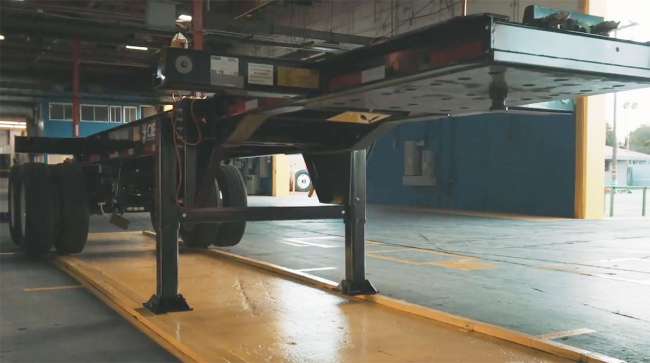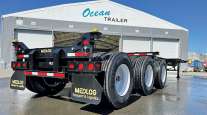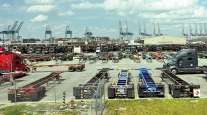Staff Reporter
CIE Cleared of Chinese-Related Antidumping Allegations

[Stay on top of transportation news: Get TTNews in your inbox.]
CIMC Intermodal Equipment was cleared by federal officials of allegations that it evaded antidumping duties on chassis and subassemblies from China.
CIMC-owned CIE Manufacturing produces container chassis and sources frames from an affiliate in Thailand. A group of companies working jointly as the Coalition of American Chassis Manufacturers (CACM) had accused the company of secretly rerouting materials originating from China. U.S. Customs and Border Protection in response launched an investigation almost a year ago to determine whether the company has been evading antidumping and countervailing orders against China.
“We received the affirmative ruling from CBP saying [they] found no evidence that there was any evasion whatsoever,” said Ben Evans, vice president of sales and marketing at CIE. “They found no evidence to support any of the claims that the coalition had made against us and, unfortunately, at this point, the damage has been done to us and some of our employees.”
CIE had been receiving chassis frames through its factory in Thailand. The question for the investigation was whether that facility was just being used to covertly reroute materials from China. CBP found in its final determination May 1 that there was not substantial enough evidence to conclude the company evaded antidumping rules.

Evans
“Stoughton Trailers, a member of the Coalition of American Chassis Manufacturers, was disappointed to see CBP’s determination that CIMC — a Chinese state-owned entity — did not evade the antidumping duty and countervailing duty orders on chassis from China using their new facility in Thailand,” said Stoughton Trailers CEO Bob Wahlin. “We believe the evidence showed that CIMC was using its Thai facility to avoid the tariffs applying to Chinese products and to continue supplying the U.S. market. Stoughton will continue to monitor the situation as we work to ensure a level playing field for U.S. manufacturers in the American chassis market.”

Wahlin
The U.S. Department of Commerce had increased tariffs on Chinese container chassis imports by 200% in May 2021. CACM was a major advocate for the change, believing there was a dumping problem that was hurting domestic manufacturers. CIE had been importing materials from China but changed its approach after the new rules to start importing from Thailand., according to Evans.
“We repurposed a factory that we had in Thailand that was basically providing equipment for the Southeast Asia market,” he said. “So, we were importing the chassis frames from Thailand using no Chinese content. And we did the rest of the production here in the U.S. Shortly after that, in late 2021, we became aware that one of the members of the coalition had basically changed their business model from domestic manufacturing in the U.S. to outsourcing and using a third-party in Vietnam.”
CIE in response brought a complaint against a coalition member, Dorsey Intermodal, in January 2022. The complaint alleged that chassis from China were being rerouted from Vietnam locations to avoid duties. Dorsey eventually was found to have knowingly imported nearly finished Chinese chassis in a ruling in June 2023.
“To be honest, do I feel that there was some form of retaliatory thinking in there? One hundred percent,” said Trevor Ash, CEO of CIE. “We knew our processes, there was nothing factual to [the allegations]. I would say it did feel retaliatory, whether it was or whether it wasn’t. It certainly felt like it was.”
Robby Hamby of Bridgestone Americas and Ken Eggen of Wolf River Express share how fleets should acquire the right tire monitoring tools for data collection. Tune in above or by going to RoadSigns.ttnews.com.
Evans asserts the coalition had no hard evidence to support its claims and instead only brought speculation and opinions. But he also noted the resulting investigation still hindered his business. He had to stop importing the chassis frames and cut back on production staff. Those cutbacks were mostly focused on three facilities in Virginia and California.
“Essentially for the past 10 months we’ve been at a complete standstill,” Evans said. “We’ve had to cut back significantly, almost 200 jobs from those locations. We don’t have the materials that we need to continue to manufacture chassis. It’s had a major impact on us and our business.”





